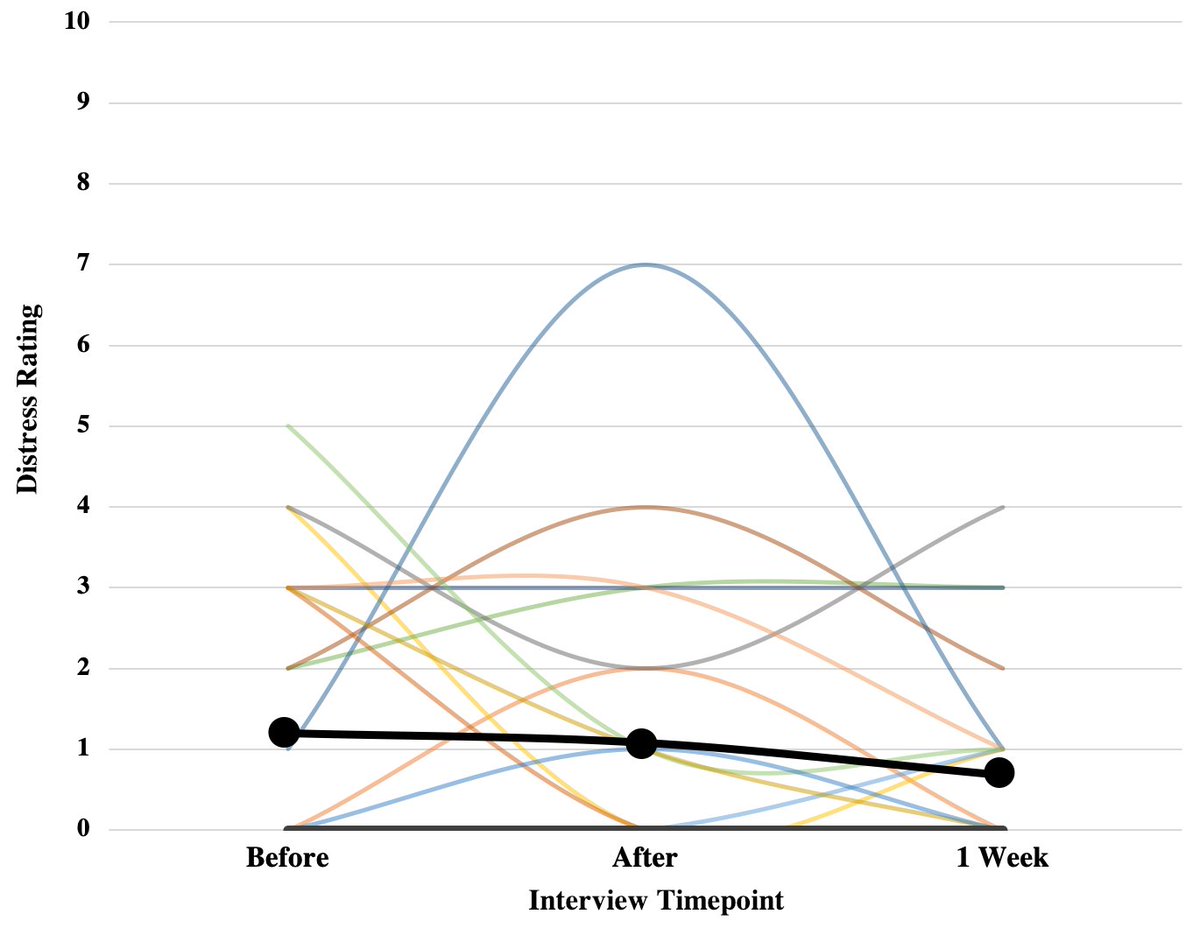Do #qualitative interviews cause #distress when used for sensitive topics and/or in sensitive populations?
A thread (& case study with #cancer #survivors).
1/5
A thread (& case study with #cancer #survivors).
1/5
2/5 #Qualitative research is ideally suited to gain rich insights into human experience, including those with medical conditions and at-risk groups.
But, one #barrier to conducting #Qualitative interviews is concern (often from physicians or IRB/ethics) of causing #distress
But, one #barrier to conducting #Qualitative interviews is concern (often from physicians or IRB/ethics) of causing #distress
3/5 Yet, data on distress around #qualitative #interviews with medical pops is lacking.
In our new #PsychoOncologypaper, #AYA #cancersurvivors completed a validated distress screening tool before, after & 1 week after an interview on #fearofrecurrence
https://onlinelibrary.wiley.com/doi/epdf/10.1002/pon.5544">https://onlinelibrary.wiley.com/doi/epdf/...
In our new #PsychoOncologypaper, #AYA #cancersurvivors completed a validated distress screening tool before, after & 1 week after an interview on #fearofrecurrence
https://onlinelibrary.wiley.com/doi/epdf/10.1002/pon.5544">https://onlinelibrary.wiley.com/doi/epdf/...
4/5 We found:
 https://abs.twimg.com/emoji/v2/... draggable="false" alt="🗣️" title="Silhouette eines sprechenden Kopfes" aria-label="Emoji: Silhouette eines sprechenden Kopfes"> Ave. distress levels were low at all timepoints
https://abs.twimg.com/emoji/v2/... draggable="false" alt="🗣️" title="Silhouette eines sprechenden Kopfes" aria-label="Emoji: Silhouette eines sprechenden Kopfes"> Ave. distress levels were low at all timepoints
 https://abs.twimg.com/emoji/v2/... draggable="false" alt="🗣️" title="Silhouette eines sprechenden Kopfes" aria-label="Emoji: Silhouette eines sprechenden Kopfes"> Mean distress was highest before the interview (anticipatory anxiety?)
https://abs.twimg.com/emoji/v2/... draggable="false" alt="🗣️" title="Silhouette eines sprechenden Kopfes" aria-label="Emoji: Silhouette eines sprechenden Kopfes"> Mean distress was highest before the interview (anticipatory anxiety?)
 https://abs.twimg.com/emoji/v2/... draggable="false" alt="🗣️" title="Silhouette eines sprechenden Kopfes" aria-label="Emoji: Silhouette eines sprechenden Kopfes"> One p& #39;t had a distress peak after the interview, but quickly resolved
https://abs.twimg.com/emoji/v2/... draggable="false" alt="🗣️" title="Silhouette eines sprechenden Kopfes" aria-label="Emoji: Silhouette eines sprechenden Kopfes"> One p& #39;t had a distress peak after the interview, but quickly resolved
 https://abs.twimg.com/emoji/v2/... draggable="false" alt="🗣️" title="Silhouette eines sprechenden Kopfes" aria-label="Emoji: Silhouette eines sprechenden Kopfes"> Given variability, distress screening protocols may be useful
https://abs.twimg.com/emoji/v2/... draggable="false" alt="🗣️" title="Silhouette eines sprechenden Kopfes" aria-label="Emoji: Silhouette eines sprechenden Kopfes"> Given variability, distress screening protocols may be useful
5/5 In sum, we found little evidence that #qualitative interviews on a sensitive topic ( #fearofrecurrence) and in a sensitive population (young #cancersurvivors) cause lasting distress.
Anecdotally, p& #39;ts reported interview as #cathartic & a chance to reflect on a life experience
Anecdotally, p& #39;ts reported interview as #cathartic & a chance to reflect on a life experience

 Read on Twitter
Read on Twitter
 Ave. distress levels were low at all timepointshttps://abs.twimg.com/emoji/v2/... draggable="false" alt="🗣️" title="Silhouette eines sprechenden Kopfes" aria-label="Emoji: Silhouette eines sprechenden Kopfes"> Mean distress was highest before the interview (anticipatory anxiety?)https://abs.twimg.com/emoji/v2/... draggable="false" alt="🗣️" title="Silhouette eines sprechenden Kopfes" aria-label="Emoji: Silhouette eines sprechenden Kopfes"> One p& #39;t had a distress peak after the interview, but quickly resolvedhttps://abs.twimg.com/emoji/v2/... draggable="false" alt="🗣️" title="Silhouette eines sprechenden Kopfes" aria-label="Emoji: Silhouette eines sprechenden Kopfes"> Given variability, distress screening protocols may be useful" title="4/5 We found:https://abs.twimg.com/emoji/v2/... draggable="false" alt="🗣️" title="Silhouette eines sprechenden Kopfes" aria-label="Emoji: Silhouette eines sprechenden Kopfes"> Ave. distress levels were low at all timepointshttps://abs.twimg.com/emoji/v2/... draggable="false" alt="🗣️" title="Silhouette eines sprechenden Kopfes" aria-label="Emoji: Silhouette eines sprechenden Kopfes"> Mean distress was highest before the interview (anticipatory anxiety?)https://abs.twimg.com/emoji/v2/... draggable="false" alt="🗣️" title="Silhouette eines sprechenden Kopfes" aria-label="Emoji: Silhouette eines sprechenden Kopfes"> One p& #39;t had a distress peak after the interview, but quickly resolvedhttps://abs.twimg.com/emoji/v2/... draggable="false" alt="🗣️" title="Silhouette eines sprechenden Kopfes" aria-label="Emoji: Silhouette eines sprechenden Kopfes"> Given variability, distress screening protocols may be useful" class="img-responsive" style="max-width:100%;"/>
Ave. distress levels were low at all timepointshttps://abs.twimg.com/emoji/v2/... draggable="false" alt="🗣️" title="Silhouette eines sprechenden Kopfes" aria-label="Emoji: Silhouette eines sprechenden Kopfes"> Mean distress was highest before the interview (anticipatory anxiety?)https://abs.twimg.com/emoji/v2/... draggable="false" alt="🗣️" title="Silhouette eines sprechenden Kopfes" aria-label="Emoji: Silhouette eines sprechenden Kopfes"> One p& #39;t had a distress peak after the interview, but quickly resolvedhttps://abs.twimg.com/emoji/v2/... draggable="false" alt="🗣️" title="Silhouette eines sprechenden Kopfes" aria-label="Emoji: Silhouette eines sprechenden Kopfes"> Given variability, distress screening protocols may be useful" title="4/5 We found:https://abs.twimg.com/emoji/v2/... draggable="false" alt="🗣️" title="Silhouette eines sprechenden Kopfes" aria-label="Emoji: Silhouette eines sprechenden Kopfes"> Ave. distress levels were low at all timepointshttps://abs.twimg.com/emoji/v2/... draggable="false" alt="🗣️" title="Silhouette eines sprechenden Kopfes" aria-label="Emoji: Silhouette eines sprechenden Kopfes"> Mean distress was highest before the interview (anticipatory anxiety?)https://abs.twimg.com/emoji/v2/... draggable="false" alt="🗣️" title="Silhouette eines sprechenden Kopfes" aria-label="Emoji: Silhouette eines sprechenden Kopfes"> One p& #39;t had a distress peak after the interview, but quickly resolvedhttps://abs.twimg.com/emoji/v2/... draggable="false" alt="🗣️" title="Silhouette eines sprechenden Kopfes" aria-label="Emoji: Silhouette eines sprechenden Kopfes"> Given variability, distress screening protocols may be useful" class="img-responsive" style="max-width:100%;"/>


